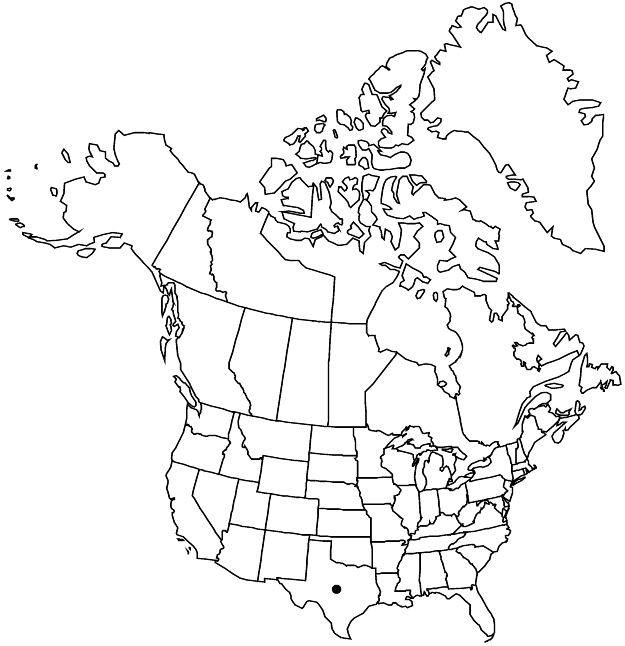Difference between revisions of "Cyclanthera dissecta"
J. Bot. (Hooker) 3: 280. 1841.
FNA>Volume Importer |
imported>Volume Importer |
||
| (6 intermediate revisions by 2 users not shown) | |||
| Line 12: | Line 12: | ||
|label=Endemic | |label=Endemic | ||
}} | }} | ||
| − | |basionyms={{Treatment/ID/ | + | |basionyms={{Treatment/ID/Basionym |
|name=Discanthera dissecta | |name=Discanthera dissecta | ||
|authority=Torrey & A. Gray | |authority=Torrey & A. Gray | ||
| + | |rank=species | ||
| + | |publication_title=Fl. N. Amer. | ||
| + | |publication_place=1: 697. 1840 | ||
}} | }} | ||
|synonyms= | |synonyms= | ||
| Line 31: | Line 34: | ||
|elevation=20–70 m | |elevation=20–70 m | ||
|distribution=Tex. | |distribution=Tex. | ||
| − | |discussion=<p>Cyclanthera dissecta is a rarely collected endemic of the southeastern Texas coastal plain (G. L. Nesom 2014), known only from five counties (Austin, Brazoria, Brazos, Grimes, Victoria). It differs from the plants of central Texas (previously identified as C. dissecta, here as C. naudiniana) in its smaller staminate flowers and anthers, short fruiting peduncles, and especially in its paniculate-racemoid staminate inflorescences with an abounding number of flowers.</p> | + | |discussion=<p><i>Cyclanthera dissecta</i> is a rarely collected endemic of the southeastern Texas coastal plain (G. L. Nesom 2014), known only from five counties (Austin, Brazoria, Brazos, Grimes, Victoria). It differs from the plants of central Texas (previously identified as <i>C. dissecta</i>, here as <i>C. naudiniana</i>) in its smaller staminate flowers and anthers, short fruiting peduncles, and especially in its paniculate-racemoid staminate inflorescences with an abounding number of flowers.</p> |
|tables= | |tables= | ||
|references= | |references= | ||
| Line 40: | Line 43: | ||
-->{{#Taxon: | -->{{#Taxon: | ||
name=Cyclanthera dissecta | name=Cyclanthera dissecta | ||
| − | |||
|authority=(Torrey & A. Gray) Arnott | |authority=(Torrey & A. Gray) Arnott | ||
|rank=species | |rank=species | ||
| Line 55: | Line 57: | ||
|publication year=1841 | |publication year=1841 | ||
|special status=Endemic | |special status=Endemic | ||
| − | |source xml=https:// | + | |source xml=https://bitbucket.org/aafc-mbb/fna-data-curation/src/2e0870ddd59836b60bcf96646a41e87ea5a5943a/coarse_grained_fna_xml/V6/V6_18.xml |
|genus=Cyclanthera | |genus=Cyclanthera | ||
|species=Cyclanthera dissecta | |species=Cyclanthera dissecta | ||
Latest revision as of 23:19, 5 November 2020
Stems glabrous except for minutely villosulous nodes; tendrils 2-branched, rarely (shortest tendrils) unbranched. Leaves 3-foliolate, lateral pair of leaflets deeply divided, petiolules 3–5 mm, terminal leaflet 3–4.5 cm, blade broadly lanceolate, petiolule 7–15 mm, linear, abruptly broadening into leaflet base, leaflet margins coarsely serrate to shallowly or deeply lobed; petioles 10–21 mm. Staminate inflorescences 5–11 cm, floriferous portion 3–7 cm, (50–)65–90(–130)-flowered, paniculate-racemoid, lateral branches 3–25 mm, longest proximally; flowers solitary, in fascicles of 2–4, or along short axes. Staminate corollas 3.5–4.9 mm diam. Anther heads 0.6–0.8 mm diam., subsessile, glabrous. Fruiting peduncles 4–6 mm. Capsules narrowly ovoid, slightly oblique, short-beaked, 15–25 mm, spinules 3–4 mm.
Phenology: Flowering Sep–Nov.
Habitat: Riparian woods and thickets, bottomlands
Elevation: 20–70 m
Discussion
Cyclanthera dissecta is a rarely collected endemic of the southeastern Texas coastal plain (G. L. Nesom 2014), known only from five counties (Austin, Brazoria, Brazos, Grimes, Victoria). It differs from the plants of central Texas (previously identified as C. dissecta, here as C. naudiniana) in its smaller staminate flowers and anthers, short fruiting peduncles, and especially in its paniculate-racemoid staminate inflorescences with an abounding number of flowers.
Selected References
None.
